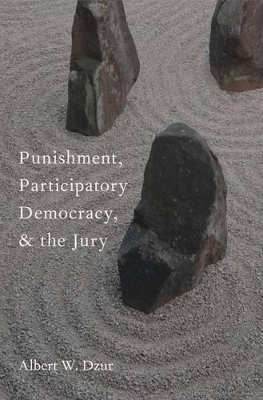
Punishment, Participatory Democracy, and the Jury
Seiten
2012
Oxford University Press Inc (Verlag)
978-0-19-987409-5 (ISBN)
Oxford University Press Inc (Verlag)
978-0-19-987409-5 (ISBN)
Focusing contemporary democratic theory on the neglected topic of punishment, Punishment, Participatory Democracy, and the Jury argues for increased civic engagement in criminal justice as an antidote to the American penal state. Albert W. Dzur considers how the jury, rather than merely expressing unreflective public opinion, may serve as a participatory institution that gathers and utilizes citizen's juridical capabilities. In doing so, the book resists trends in criminal justice scholarship that blame increases in penal severity on citizen participation and rejects political theorists' longstanding skepticism of lay abilities.
Dzur distinguishes constructive citizen involvement that takes responsibility for public problems from a mass politics mobilized superficially around single issues. This more positive view of citizen action, which was once a major justification for the jury trial, is now also manifest in the restorative justice movement, which has incorporated lay people into community boards and sentencing circles. Both jury trials and restorative justice programs, Dzur explains, are examples of rational disorganization, in which lay citizen action renders a process less efficient yet also contributes valuable qualities such as attunement, reflectiveness, and full-bodied communication. While restorative justice programs and participatory policy forums such as citizens' juries have become attractive to reformers, traditional juries have suffered a steep and troubling decline. Punishment, Participatory Democracy, and the Jury advocates a broader role for jurors in the criminal courts and more widespread use of jury trials.
Though no panacea for a political culture grown too comfortable with criminalization and incarceration, participatory institutional designs that rationally disorganize punishment practices and slow down criminal justice can increase civic responsibility and public awareness about the need to find alternative paths forward for America's broken penal system.
Dzur distinguishes constructive citizen involvement that takes responsibility for public problems from a mass politics mobilized superficially around single issues. This more positive view of citizen action, which was once a major justification for the jury trial, is now also manifest in the restorative justice movement, which has incorporated lay people into community boards and sentencing circles. Both jury trials and restorative justice programs, Dzur explains, are examples of rational disorganization, in which lay citizen action renders a process less efficient yet also contributes valuable qualities such as attunement, reflectiveness, and full-bodied communication. While restorative justice programs and participatory policy forums such as citizens' juries have become attractive to reformers, traditional juries have suffered a steep and troubling decline. Punishment, Participatory Democracy, and the Jury advocates a broader role for jurors in the criminal courts and more widespread use of jury trials.
Though no panacea for a political culture grown too comfortable with criminalization and incarceration, participatory institutional designs that rationally disorganize punishment practices and slow down criminal justice can increase civic responsibility and public awareness about the need to find alternative paths forward for America's broken penal system.
Albert W. Dzur is an Associate Professor of Political Science and Philosophy, Bowling Green State University and author of Professionalism: Citizen Participation and the Reconstruction of Professional Ethics, Identity, and Practice (Penn State, 2008)
Acknowledgments ; 1. Three Puzzles about Crime, Punishment, and the Death of the American Jury ; 2. The Myth of Penal Populism ; 3. Participatory Democracy and Rational Disorganization ; 4. The Jury as a Civic Schoolhouse ; 5. Democracy in the Court: Lay Contributions to Justice ; 6. Juries, Juries, Everywhere (But Not Inside the Courts) ; 7. Reviving the Jury: Active Juries, Juror Activism, and Institutional Change ; 8. Public Justice vs. the Penal State ; Bibliography ; Index
| Reihe/Serie | Studies in Penal Theory and Philosophy |
|---|---|
| Verlagsort | New York |
| Sprache | englisch |
| Maße | 239 x 160 mm |
| Gewicht | 454 g |
| Themenwelt | Geisteswissenschaften ► Philosophie |
| Recht / Steuern ► EU / Internationales Recht | |
| Recht / Steuern ► Strafrecht ► Kriminologie | |
| Recht / Steuern ► Strafrecht ► Strafverfahrensrecht | |
| ISBN-10 | 0-19-987409-3 / 0199874093 |
| ISBN-13 | 978-0-19-987409-5 / 9780199874095 |
| Zustand | Neuware |
| Haben Sie eine Frage zum Produkt? |
Mehr entdecken
aus dem Bereich
aus dem Bereich
klare Antworten aus erster Hand
Buch | Softcover (2023)
UTB (Verlag)
19,90 €


